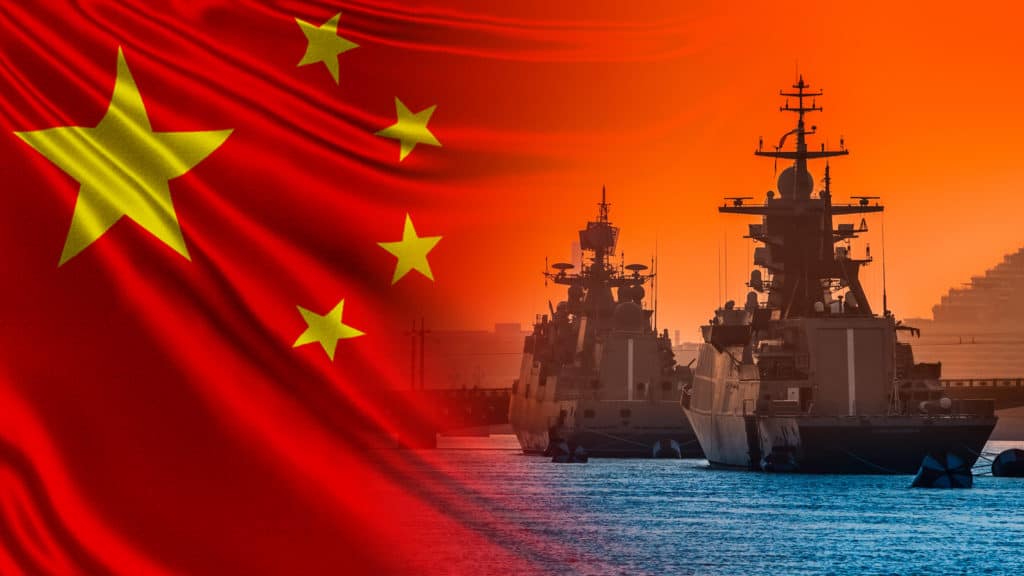Beijing’s militarization of South China Sea islands can cause US, allies ‘all sorts of problems’

Warships on the background of the flag of China. PRC's Navy. Navy of the Republic of China. Ships of the Chinese Navy. Protecting China's water borders. Fleet of the world's countries.
Editor’s Note: Center Senior Fellow Grant Newsham was interviewed by the Epoch Times for this piece
Beijing’s growing aggressiveness and military buildup in the South China Sea pose risks to the commercial interests and the security of many nations, and especially powers on friendly terms with the United States such as Japan, South Korea, and Australia.
This warning was made by security analyst Grant Newsham, who also said the moment was ripe for the United States to leverage its amicable relationship with Japan in order to deter Chinese Communist Party (CCP) aggression and uphold stability in the region.
He spoke to the significance of recent revelations by U.S. Indo-Pacific Commander Adm. John Aquilino that Beijing had fully militarized three artificial islands in the disputed South China Sea.
“China has expanded its ability to conduct military operations about 1,500 miles farther offshore from China. So now China can reach down to Australia, well into the Southwest Pacific, and off into the Central Pacific. And from these bases, it can cause the Americans and America’s friends all sorts of problems,” Newsham, a senior fellow at the Japan Forum for Strategic Studies, recently told Epoch TV’s “Forbidden News” program.
Newsham described the islands as full-blown military outposts, one of them roughly equal to Washington D.C. in size, and another as big as the U.S. base at Pearl Harbor in Hawaii. The outposts have 10,000-foot runways for military planes, anti-ship missiles, anti-aircraft systems, and maintenance facilities, he said.
While the rapid buildup of these outposts may have caught some observers off guard, Newsham said that the construction and militarization of the islands have been underway since 2014 and that it has been “completely obvious” what Beijing hoped to achieve here.
“And this despite Xi Jinping having promised [then-President Barrack] Obama they would not militarize them. But it’s no surprise that that’s what has happened, and now we’re acting like it is,” Newsham said.
“Throughout this period, there were people who were saying, look, the Chinese are going to militarize, they’re going to establish the ability to take control of the South China Sea, which is an area of international waters about one and a half times as big as the Mediterranean Ocean. China just said, ‘It’s there, so we’re going to take it,’” he observed.
Newsham identified steps that policymakers and lawmakers could have taken to thwart Beijing’s moves. These include suspending the Chinese central bank’s license to operate in the United States for six months, and making public the financial holdings and real estate holdings of the top 50 CCP leaders. But instead of facing the issue and countering Chinese expansion in the region, U.S. elites allowed their symbiotic relationship with China’s business sector to keeping growing.
“Over the last 30 years, America’s business class, financial class, and even much of its political class has gotten itself hooked on Chinese money. The idea is that if you do business in China, you overlook all of the human rights problems, violations, and atrocities, and overlook the fact that China wants to drive America out of the Asia-Pacific,” Newsham said.
- Military Starship: How SpaceX Is About to Make America Globally Dominant - March 4, 2025
- The Cautionary Tale of Zheng He - December 4, 2024
- Frank Gaffney departs CSP after 36 years - September 27, 2024
